Weekly episode drops are better than a binge. And there’s data to back it up

- Share via
Welcome to Screen Gab, the newsletter for everyone who loves hanging around the proverbial water-cooler.
That’s because buzz / chatter / conversation / your term of choice is the subject of this week’s Break Down, featuring exclusive data from Fandom about how binge and weekly episode releases are working to generate fan engagement around some of TV’s top shows.
Also in this week’s Screen Gab, we encourage you to catch up on the “wondrous inventions” of “The Blacklist” and offer two additional streaming recommendations for your weekend.
You are reading Screen Gab newsletter
Sign up to get recommendations for the TV shows and streaming movies you can’t miss, plus exclusive interviews with the talent behind your favorite titles, in your inbox every Friday
You may occasionally receive promotional content from the Los Angeles Times.
ICYMI
Must-read stories you might have missed
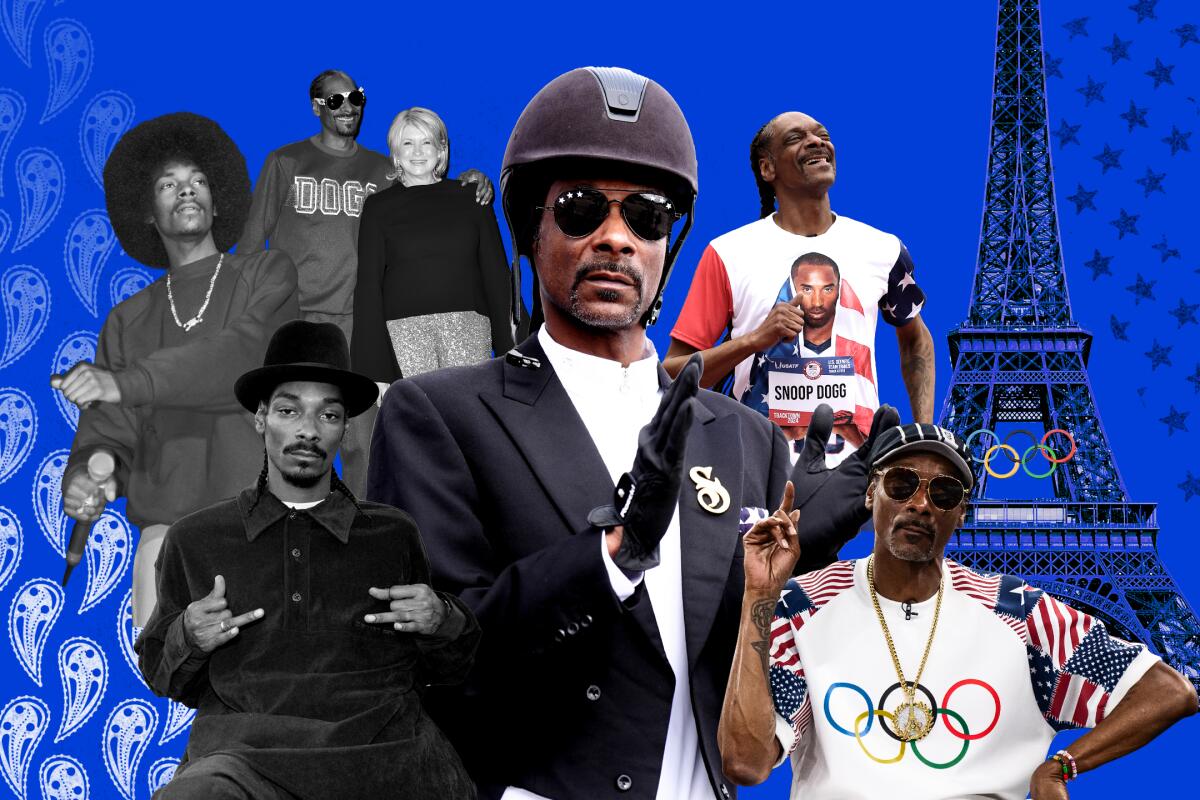
How Snoop Dogg became America’s sweetheart at the Paris Olympics: A look at the decades-long evolution of the onetime gangsta rapper who now finds himself the family-friendly star of NBC’s Olympics coverage.
Two seasons in, ‘House of the Dragon’ feels like a flop. There’s a glaring reason why: As with the expansion of the ‘Lord of the Rings’ and Marvel franchises, ‘House of the Dragon’ has lost the sense of humor that made ‘Game of Thrones’ great.
‘House of the Dragon’ Season 2 finale: Rhaenyra and Alicent’s ‘battle between pain and love’: Geeta Vasant Patel, director of ‘The Queen Who Ever Was,’ discusses the old friends’ relationship, Daemon’s vision and filming the episode’s montages.
‘There’s a crisis in comedy right now’: Paul W. Downs explains how ‘Hacks’ is fighting back: In the latest episode of the Envelope video podcast, we ask “Hacks” star Paul W. Downs if “The Bear” is a comedy. Plus, Tyler James Williams reveals that the “Abbott Elementary” team loves frustrating viewers.
Turn on
Recommendations from the film and TV experts at The Times
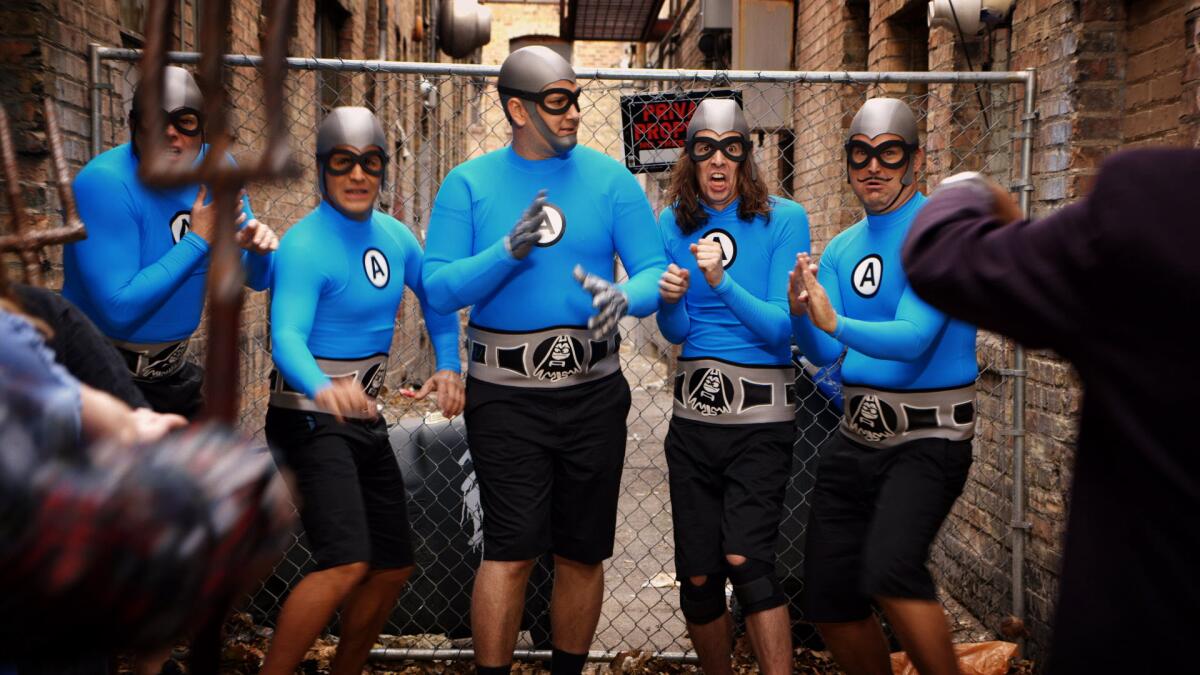
“The Aquabats! Super Show!” (Tubi, Pluto, YouTube)
The creative team behind “Yo Gabba GabbaLand!,” which premieres today on Apple TV+, was also the brains, heart and soul behind this other (sort of) kids’ show, which ran on the no-longer extant Hub Network from 2012 to 2014 and whose 21 episodes happily may be accessed free from a number of streaming and online sources. Born in the 20th century as a South Bay rock-ska-skate band that performed as costumed superheroes, this group was born to inhabit this series. A comic pastiche of cheap Saturday morning entertainments from the late ’70s and early ’80s, it finds the group — Ricky Fitness, Crash McLarson, Jimmy the Robot, EagleBones Falconhawk and the M.C. Bat Commander (series co-creator Christian Jacobs) — traveling the land in its Battle Tram, playing shows and fighting a colorful variety of mutant foes. (A cactus monster, a laundry monster, a floating eyeball of death.) It’s like a cross between the Monkees and the Power Rangers and just as awesome as that sounds. The Aquabats’ own YouTube channel also incudes the later short-form web series “Saturday Morning With the Aquabats!” and “All New RadVentures! with the Aquabats!” — Robert Lloyd
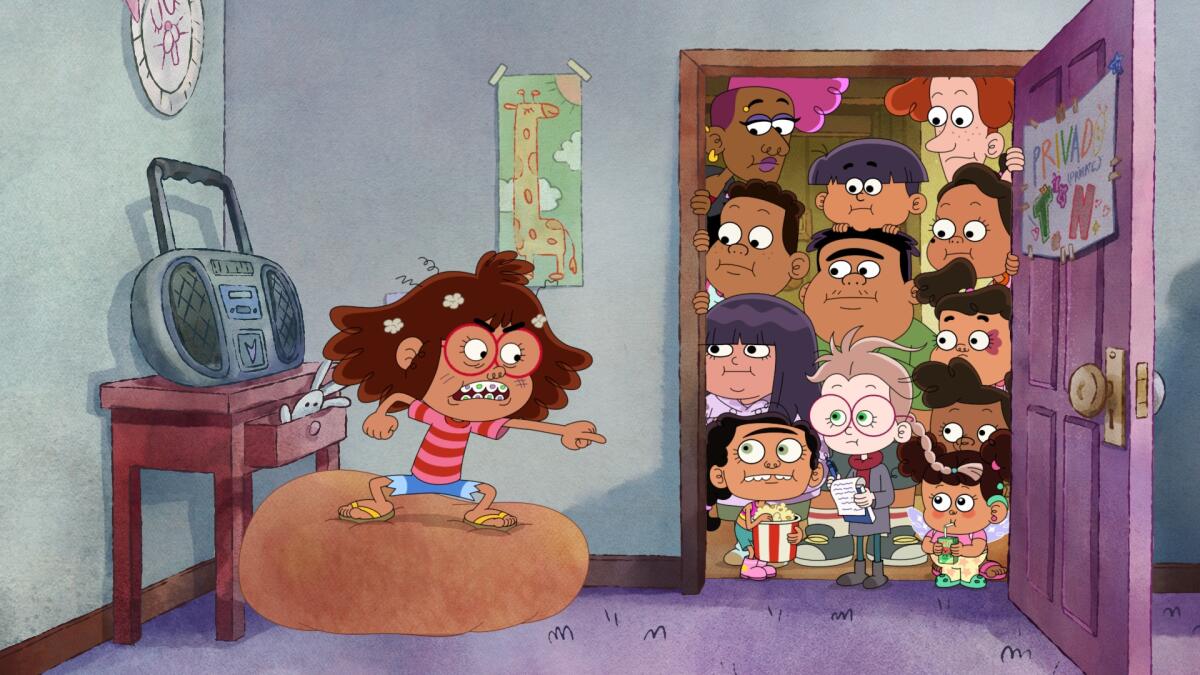
“Primos” (Disney+)
Summer break was a magical time when I was a kid: the special excitement that comes with knowing that you have months of seemingly endless, mostly unstructured days to spend doing all kinds of things you don’t have a chance to do during the school year. (Plus homework, thanks to my parents.) “Primos” manages to capture some of those feelings. Created by Natasha Kline, the animated series follows Tater Ramirez Humphrey, a creative nearly 10-year-old with a wild imagination who had big plans to spend her summer vacation sorting out her goals and dreams. But her plans get a bit derailed when she learns that her mother has invited all 12 of her primos to spend the summer at their home — though it turns out that nobody is better suited to cheer you on and help you figure out who you want to be than your wacky family that loves you. Summer break might be winding down for students in and around L.A., but thankfully, the first nine episodes of the show are available on Disney+ to help us bask in that feeling for a little bit longer. — Tracy Brown
Catch up
Everything you need to know about the film or TV series everyone’s talking about
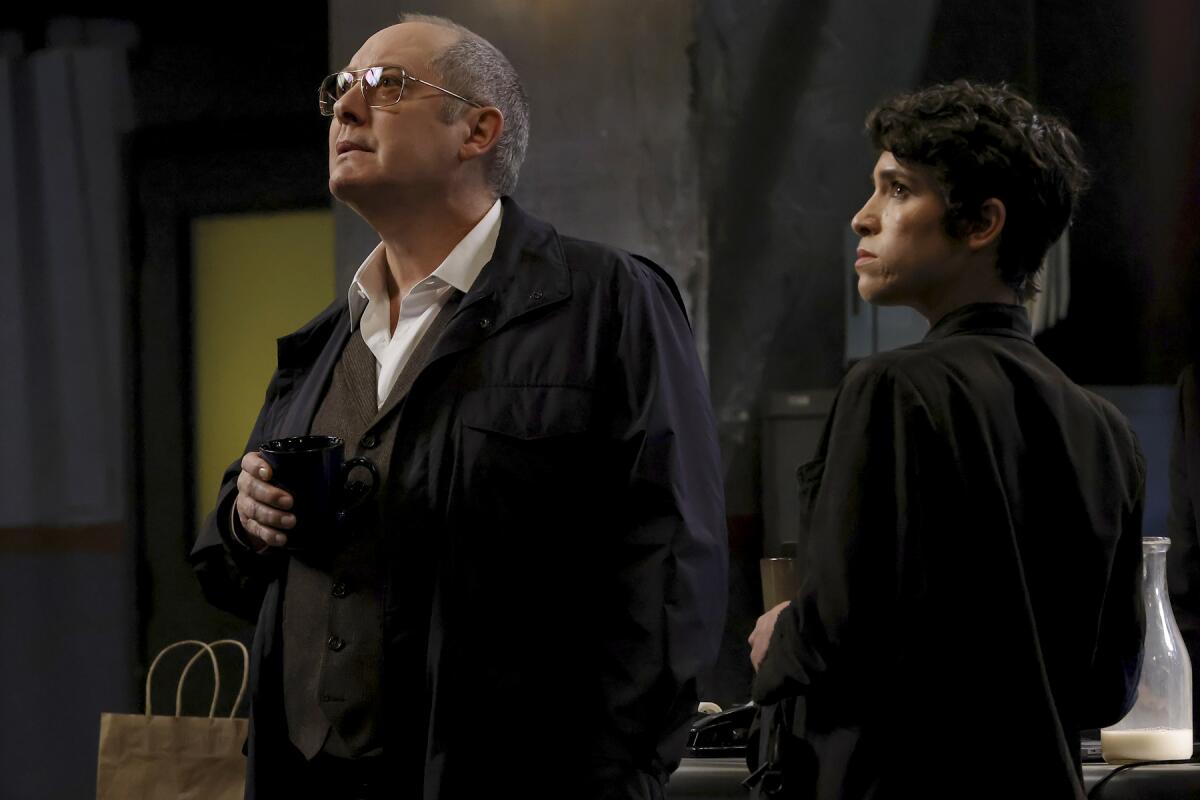
Showcasing political corruption and the regular killings of high-ranking U.S. officials, NBC’s “The Blacklist,” currently available on Netflix, might seem a counter-intuitive re-watch during an election year. But it is so delightfully bonkers that once begun it is difficult to stop. One comes, of course, for James Spader, who, as Raymond “Red” Reddington, International Criminal of Great Mystery, appears to be having more fun than any actor carrying a 10-season network show has ever had. In the pilot, his seemingly unflappable Reddington, No. 1 on the FBI’s fugitive list, turns himself in, with the offer of serving up, on a weekly basis, terrible people who would otherwise elude the law — the titular Black List. His demand is that he speak only to agent Elizabeth Keen (Megan Boone), a newbie profiler who knows Red only from the wanted posters.
Each episode brings a new case, along with fresh examples of Red’s bon ot-dropping ruthlessness and hints at his mysterious past; his “cleaner,” Mr. Kaplan (Susan Blommaert), is one of television’s most wondrous inventions. The cast is strong, the action relentless and the body count very high. The various political plots (and there are many) are so deliciously over the top that an international cabal often found at their center is called, literally, the Cabal. And if Spader weren’t enough, the guest star list includes the likes of Alan Alda, Dianne Wiest, Leslie Jones, Nathan Lane, Martha Plimpton, Brian Dennehy and Stacy Keach.
Sure, the speculation of who Red is to Elizabeth grows a bit tedious at times, as does the sight of every agent involved wondering whether working with Red is worth it — you could play a drinking game based on the number of times Elizabeth or one of her colleagues declares, “I’m out.” But then Spader will dig into a line like “There’s nothing that can’t be accomplished with a little ingenuity and a lot of explosives” and nothing matters beyond what Red will do, or say, next. — Mary McNamara
Break down
Times staffers chew on the pop culture of the moment — love it, hate it or somewhere in between
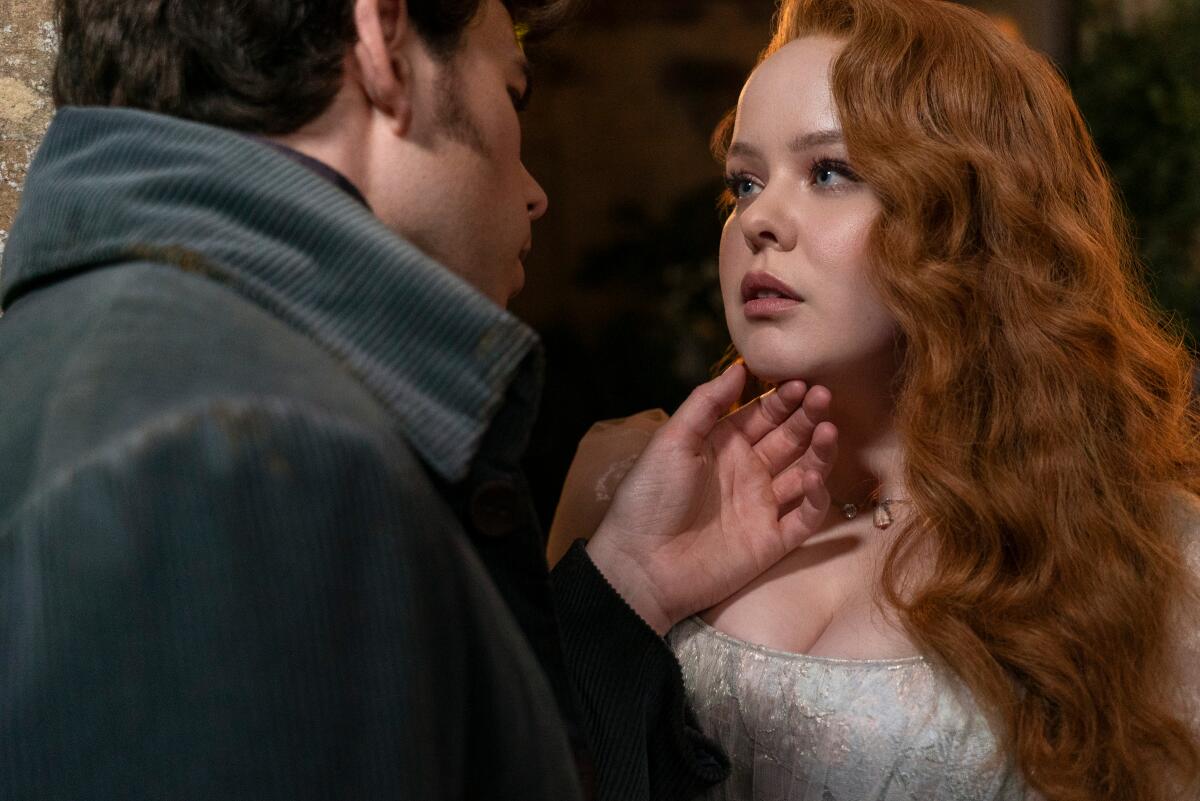
At least since the start of the streaming wars, TV viewers have debated the merits of the Netflix-style binge model versus the traditional weekly episode release — along with every kind of hybrid strategy in between. And, notwithstanding your fond memories of inhaling entire seasons of “Orange Is the New Black” in a single weekend, that battle has been won: With increasingly rare exceptions (“Baby Reindeer,” for instance), the TV series that dominate the water-cooler conversation arrive the old-fashioned way, week by scintillating week. Streaming platforms have also taken notice, with Amazon Prime Video (“The Boys”) and even Netflix itself (“Love Is Blind”) revisiting their early commitment to the binge model in search of that all-important “buzz.”
Now there’s data to back up the conclusion that weekly episode drops build and sustain a show’s place in the zeitgeist better than the binge.
In data collected by fan communities platform Fandom and made available exclusively to The Times, series released weekly generate 33% more engagement during their release window than those released all at once — and sustain that engagement for nearly 50% longer than their binge counterparts. In other words, stretching a season-long arc over eight or 10 weeks not only generates more buzz but it also extends a series’ post-finale long tail. (The main exceptions, Fandom found, were established powerhouses like “Stranger Things” and “Ozark.”)
But “no one size fits all,” cautions Fandom’s chief marketing officer, Stephanie Fried, who’s previously worked for NBCUniversal and Discovery. “If you want to keep a subscriber and you want to reduce churn, weekly is the better bet because you’re going to obviously hold onto someone — they can’t come on, watch it and unsubscribe... If you have things that someone binges, but then give them something else to binge because you have so much relevant content, it doesn’t matter as much.”
Fandom’s measurements are based on visits to its 50 million pages by 300 million users per month, including data about what pages they visit, how many pages they visit and the depth of their scroll on each page. It might not be the mark of flawless storytelling, but viewers like me who spent hours during the recent second season searching the platform’s wikis for information to make sense of “House of the Dragon” certainly point to interest in the HBO series, for instance.
“The other place weekly is smart is for a new show where you want to start to get some traction and some discussion,” Fried says. “On Fandom, but also on social networks, you’re going to get more word-o’-mouth buzz over a longer time period that’s going to make people more likely to tune in and start watching the show. From an acquisition perspective, it’s going to benefit you longer.”
As for the two-part release model, lately adopted by Netflix for heavy hitters like “Bridgerton” and “Emily in Paris,” the results appear to be mixed: The most recent season of “Bridgerton,” starring Luke Newton and Nicola Coughlan, “didn’t do as well” as previous ones in terms of engagement on Fandom, according to Fried.
“The coming back and remembering when to tune in again, it’s almost like they had to double up on the promotion,” she says, noting that Fandom has discussed adding features that would help users find out when their favorite shows will return. “People are already confused about release timelines, and now you’ve introduced another variable.”
Data from the likes of Fandom and Parrot Analytics can add helpful context to Nielsen streaming rankings and platforms’ own, selective use of viewership numbers, but perhaps the most telling revelation in the study shared with The Times is more foundational than the fight over release strategies. Examining some of the most talked-about TV series of 2024, Fandom found that the “The Boys” (weekly), “Bridgerton” (hybrid) and “The Bear” (binge) all experienced an ebb in engagement compared to prior seasons, while relative newcomer “House of the Dragon” improved only slightly from Season 1 to Season 2.
Which, given the tepid critical reaction to these titles’ most recent seasons, may be taken as evidence of something else we all knew, at least anecdotally: Making a great TV show is hard. Keeping it great is even harder. — Matt Brennan
The complete guide to home viewing
Get Screen Gab for everything about the TV shows and streaming movies everyone’s talking about.
You may occasionally receive promotional content from the Los Angeles Times.







